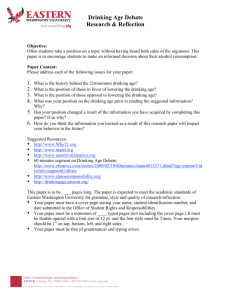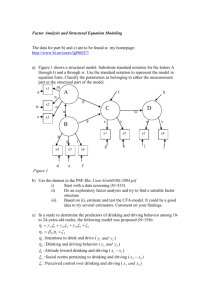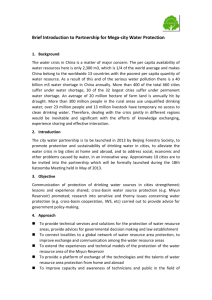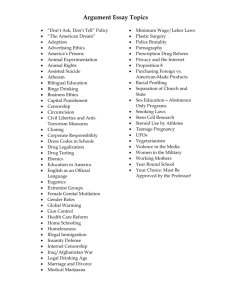Gender theory and empirical research
advertisement
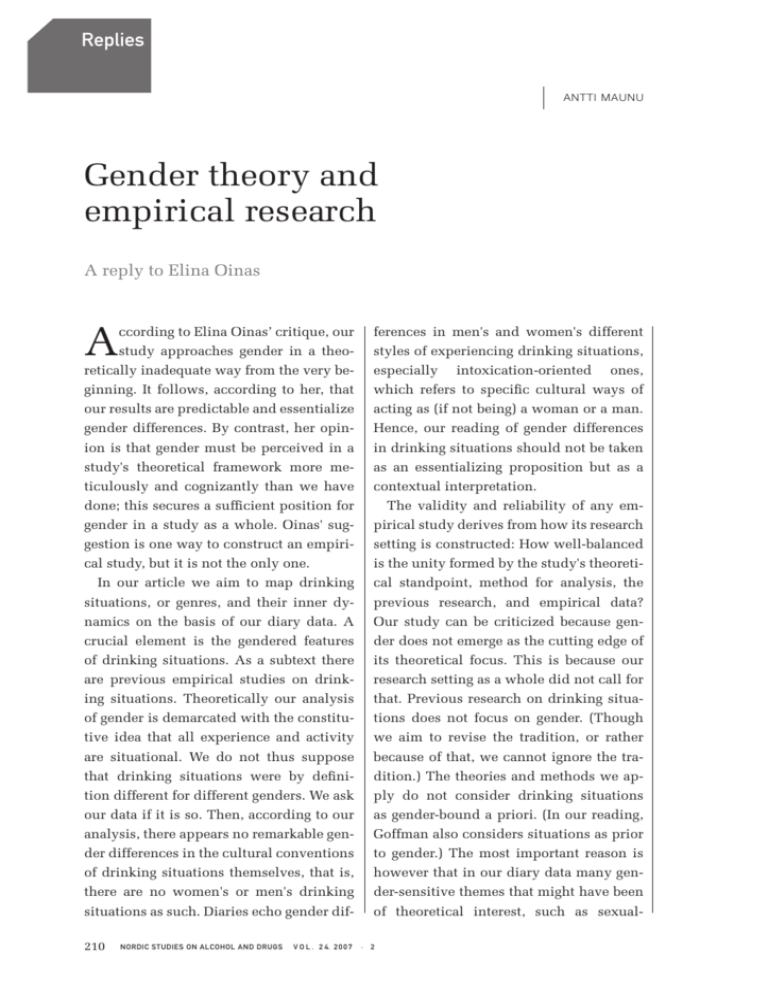
Replies ANTTI MAUNU Gender theory and empirical research A reply to Elina Oinas A ccording to Elina Oinas’ critique, our ferences in men's and women's different study approaches gender in a theo- styles of experiencing drinking situations, retically inadequate way from the very be- especially ginning. It follows, according to her, that which refers to specific cultural ways of intoxication-oriented ones, our results are predictable and essentialize acting as (if not being) a woman or a man. gender differences. By contrast, her opin- Hence, our reading of gender differences ion is that gender must be perceived in a in drinking situations should not be taken study's theoretical framework more me- as an essentializing proposition but as a ticulously and cognizantly than we have contextual interpretation. done; this secures a sufficient position for The validity and reliability of any em- gender in a study as a whole. Oinas' sug- pirical study derives from how its research gestion is one way to construct an empiri- setting is constructed: How well-balanced cal study, but it is not the only one. is the unity formed by the study's theoreti- In our article we aim to map drinking cal standpoint, method for analysis, the situations, or genres, and their inner dy- previous research, and empirical data? namics on the basis of our diary data. A Our study can be criticized because gen- crucial element is the gendered features der does not emerge as the cutting edge of of drinking situations. As a subtext there its theoretical focus. This is because our are previous empirical studies on drink- research setting as a whole did not call for ing situations. Theoretically our analysis that. Previous research on drinking situa- of gender is demarcated with the constitu- tions does not focus on gender. (Though tive idea that all experience and activity we aim to revise the tradition, or rather are situational. We do not thus suppose because of that, we cannot ignore the tra- that drinking situations were by defini- dition.) The theories and methods we ap- tion different for different genders. We ask ply do not consider drinking situations our data if it is so. Then, according to our as gender-bound a priori. (In our reading, analysis, there appears no remarkable gen- Goffman also considers situations as prior der differences in the cultural conventions to gender.) The most important reason is of drinking situations themselves, that is, however that in our diary data many gen- there are no women's or men's drinking der-sensitive themes that might have been situations as such. Diaries echo gender dif- of theoretical interest, such as sexual- 210 NORDIC STUDIES ON ALCOHOL AND DRUGS V O L . 2 4. 2 0 0 7 . 2 Replies ity, were poorly articulated. On the other not appear constructive to us to criticize hand, the gender differences that came to this study because it does not bridge all the fore were rather traditional. As Oinas discussions. A study should be evaluated also notices, these phenomena are there in on the basis of its own starting point, that the diaries, and in empirical research you is, its research setting and objective(s) as have to take your data seriously, despite a whole. how surprising, conservative, or radical it appears. Every theoretical perspective has its own, limited field of relevance just as every We could have constructed our research empirical dataset. The alchemy of empiri- setting some other way. We could have cal research is when incomplete theories supposed that gender assigns drinking sit- and incomplete datasets meet, open up uations fundamentally different for differ- and shed light on each other in a dialogue. ent actors; we could have analysed gender To me, this is the most relevant way to get differences without a reference to drinking something truly new and surprising out of situations; or we could have tested some either. But this alchemy may also produce theoretical hypothesis on the construction something that the researchers do not ex- of gender during drinking practices or their pect or wish. expression, for example. But this would Antti Maunu, M.Pol.Sc. The Finnish Foundation for Alcohol Studies Lintulahdenkuja 4, PL 220 00531 Helsinki, Finland E-mail: antti.maunu@stakes.fi have made another study, contributed to different discussions and produced different results. We are ourselves dealing also with other kinds of studies; and it does NORDIC STUDIES ON ALCOHOL AND DRUGS V O L . 24. 2007 . 2 211


